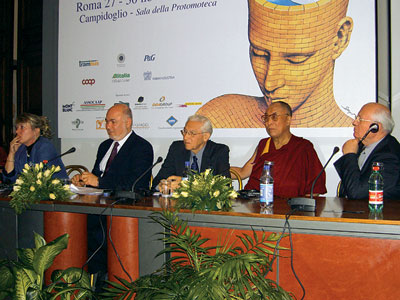Advocating Responsible Security
"It's difficult enough to think about one's own mortality; it's overwhelming to think about the mortality of the species. And that's what we're talking about." So said Jonathan Granoff '70 on the Public Radio International show Humankind in 2002.
He's referring to the consequences of nuclear war. Granoff, an attorney from Pennsylvania, is president of the Global Security Institute (GSI), an organization whose mission is "to achieve incremental steps that enhance security and lead to the global elimination of nuclear weapons." Founded by former California senator Alan Cranston, the GSI has a board of advisers that includes Jane Goodall, Mikhail Gorbachev, and Rigoberta Menchu. The institute works to educate, and influence policy made by global leaders. Its constituents include Congress, heads of state and government, and parliamentarians.
In a world that is constantly shaken by terrorists, political conflicts, and regime changes, the possibility of nuclear disaster is not an idle threat. On Humankind, Granoff stated that "the greatest threat humanity faces is the inevitable — accidental or intentional — use of a nuclear device." Currently, the nuclear arsenals of Russia and the United States hold enough firepower to literally destroy the planet.
Which is why Granoff devotes his time, scarce as it is, to advocating the elimination of nuclear arms. In addition to the GSI, Granoff is also involved with organizations such as the Lawyers Alliance for World Security, the NGO Committee on Disarmament at the UN, the Lawyers' Committee on Nuclear Policy, the Temple of Understanding, the Middle Powers Initiative, and the Committee on Arms Control and National Security.

Granoff (second from left) with Jody Williams of the International Campaign to Ban Landmines, Ron McCoy representing International Physicians for the Prevention of Nuclear War, the Dalai Lama, and Mikhail Gorbachev.
He's involved in the peace and security movement partly because "it forces us to realize that our fate is interconnected with our alleged adversary, that if we lob nuclear weapons at an adversary, we suffer as well. We cut off the limb we're sitting on." He hopes that people can come to an understanding of what he terms "global responsibility," a sense of accountability that extends beyond patriotism. "We think, 'Well, I'll protect my nation, and that will be enough.' Not now," said Granoff. "A hydrofluorocarbon molecule...does not care about national boundaries."
The danger posed by nuclear weapons isn't limited to an intentional attack by one group or country. With thousands of warheads at the ready, there is also the possibility of accidental detonation. According to the GSI Website, there are 20 to 30 nuclear weapons accidents, false alarms, or malfunctions per year. Decreasing stockpiled arms, while increasing the security of remaining nuclear weapons and materials, could make such incidents less frequent.
But as Granoff sees it, reducing the number of nuclear weapons isn't enough. As long as the potential for mutual destruction exists, everyone in the world is at risk. Granoff holds world leaders accountable for this gamble. "The little boys have got to give up their toys, because the stakes are too high right now."
To learn more about the Global Security Institute, visit www.gsinstitute.org
